Abdellatif Kechiche 35mm retrospective preview by Hans Morgenstern
FFCC member Hans Morgenstern on the films of Abdellatif Kechiche. The Coral Gables Art Cinema in Miami is now hosting a complete 35mm retrospective on the writer/director/actor entitled “Before Blue.” The Franco-Tunisian filmmaker is best known for Blue is the Warmest Color, an FFCC award-winning film.
There is probably no living director who can do what Abdellatif Kechiche can with actors. His amazing collaborations are incomparable. He pulls out some of the most natural and stirring performances from people who often have little experience. When Blue Is the Warmest Color burst onto the scene via Cannes with the Palme d’Or and best actress wins for the film’s two leads, nearly every film critics group, from the Florida Film Critics Circle to the Central Ohio Film Critics Association, to the big shots in New York to L.A., gave it the best foreign language picture.
There was the controversy of Kechiche over-working the actresses who publicly griped about the demands of the film’s lengthy, raw sex scenes. However, New Times film critic Stephanie Zacharek, gets it right in her review entitled, “Yes, Blue Is The Warmest Color Has Controversial Teen Lesbian Sex. But It Also Has Passion.”
And passion is the key word in the Franco-Tunisian writer/director/actor’s oeuvre. You’ll see it in the two love affairs as well as the friendships of a Tunisian immigrant trying to survive in Paris in Kechiche’s first film, 2000’s La Faute à Voltaire (a.k.a. Blame it on Voltaire or Poetical Refugee). Passion also fuels many wonderful extended scenes featuring teenagers who live in a Parisian immigrant housing project, as they tangle with youthful feelings of love and — again — friendship in 2003’s L’Esquive (Games of Love and Chance [pictured above]).
Then there is the lower-key but more sophisticated, La Graine et le Mulet (The Secret of the Grain), from 2007. Kechiche found a new kind of ease with the extended scene when he presented a family whose patriarch decides to open a couscous restaurant on a derelict boat. Then, if you really want controversy, forget Blue is the Warmest Color. In 2010’s Vénus noire (Black Venus), the filmmaker took on the true, 19th century story of a woman from Cape Town brought to London and then Paris for exhibition as a freak show. Kechiche pulls no punches in presenting the atrocity of her exploitation, offering a disturbing indictment on white superiority alongside black complacency and complicity.
(Read the rest on Miami New Times)


